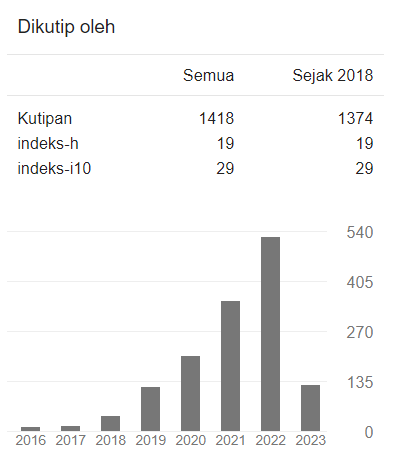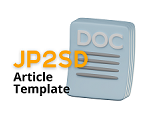Guru Profesional: Pola Transformasi Implementasi Pembelajaran Online di Sekolah Dasar
DOI:
https://doi.org/10.22219/jp2sd.v9i1.18386Abstract
Penelitian ini bertujuan untuk mendeskripsikan temuan-temuan pola strategi dalam implementasi pembelajaran daring di Sekolah Dasar selama pandemi covid-19. Penelitian ini menggunakan pendekatan kualitatif dengan metode survei yang dilakukan secara online menggunakan Microsoft form. Subjek penelitian terdiri atas 36 guru sekolah dasar yang tersebar di lima Kecamatan Kota Malang. Teknik pengumpulan data menggunakan survei online. Hasil penelitian menujukkan bahwa guru-guru melaksanakan pembelajaran daring selama pandemi covid-19 secara variatif meliputi transformasi strategi, model, dan variasi platform aplikasi baik ketika pembelajaran berlangsung maupun proses evaluasi. Transformasi strategi dan model yang digunakan sebanyak 88% menggunakan model berbasis synchronous dan 10 % menggunakan asynchronous dengan memanfaatkan ragam platform. Adapun ragam transformasi platform synchronous yang digunakan meliputi google meet 80%, zoom meeting 15%, dan Microsoft team sebanyak 5%. Selanjutnya ragam platform asynchronous yang digunakan yaitu 88% menggunakan WhatsApps, 11 % menggunakan google classroom, dan 1 % menggunakan platform LMS (learning management system). Temuan lain dalam proses evaluasi menunjukkan bahwa 72% guru menggunakan google form, 21% menggunakan kahoot, 5 % menggunakan platform live worksheet, dan 2 % melalui proses konvensional.
Downloads
References
Afriansyah, A. (2020). Guru di Masa Pandemi: Pola Adaptasi, Komunikasi, Transformasi, dan Strategi Baru Mendidik Anak. MAARIF, 15(2), 394.
Ahmed, S., Shehata, M., & Hassanien, M. (2020). Emerging Faculty Needs for Enhancing Student Engagement on a Virtual Platform. MedEd Publish, 1–5. https://doi.org/https://doi.org/10.15694/mep.2020.000075.1
Asarta, C. J., & Schmidt, J. R. (2020). The effects of online and blended experience on outcomes in a blended learning environment. Internet and Higher Education, 44(September 2019), 100708. https://doi.org/10.1016/j.iheduc.2019.100708
Atsani, K. H. L. G. M. Z. (2020). Transformasi media pembelajaran pada masa Pandemi COVID-19. Al-Hikmah: Jurnal Studi Islam, 1(1), 82–93.
Basilaia, G., & Kvavadze, D. (2020). Transition to online education in schools during a SARS-CoV-2 coronavirus (COVID-19) pandemic in Georgia. Pedagogical Research, 5(4).
Bautista, A. S. (2020). E-learning in 15 days. Challenges and renovations in Primary and Secondary Education of the Republic of Croatia during the COVID-19 crisis. How have we Introduced distance Learning? Revista Espanola de Educacion Comparada, 36, 181–195. https://doi.org/10.5944/REEC.36.2020.27637
Dewi, W. A. F. (2020). Dampak COVID-19 terhadap Implementasi Pembelajaran Daring di Sekolah Dasar. Edukatif : Jurnal Ilmu Pendidikan, 2(1), 55–61. https://doi.org/10.31004/edukatif.v2i1.89
Gherheș, V., Stoian, C. E., Fărcașiu, M. A., & Stanici, M. (2021). E-learning vs. Face-to-face learning: Analyzing students’ preferences and behaviors. Sustainability (Switzerland), 13(8). https://doi.org/10.3390/su13084381
Kuncahyono. (2017). Analisis Penerapan Media Berbasis Komputer Pada Pembelajaran Tematik Terpadu Di Sekolah Dasar. Jurnal Pemikiran Dan Pengembangan Sekolah Dasar (JP2SD), 5(2), 773–780. https://doi.org/10.22219/jp2sd.v5i2.4827
Kuncahyono. (2018). Pengembangan E-Modul (Modul Digital) dalam Pembelajaran Tematik di Sekolah Dasar. JMIE (Journal of Madrasah Ibtidaiyah Education), 2(2), 219–231. https://doi.org/10.32934/jmie.v2i2.75
Kuncahyono, M. P. K. (2019). Pengembangan Softskill Tenologi Pembelajaran Melalui Pembuatan E-Modul Bagi Guru Sekolah Dasar. TERAMPIL : Jurnal Pendidikan Dan Pembelajaran Dasar, 6(2), 128–139. https://doi.org/10.24042/terampil.v6i2.5272
Milles, M. B., Huberman, M. A., & Saldana, J. (2014). Qualitative Data Analysis A methods Sourcebook Edition 3 (Terjemahan Tjetjep Rohindi Rohidi). In Sage Publications, Inc.
Muskania, R., & Zulela, M. S. (2021). Realita Transformasi Digital Pendidikan di Sekolah Dasar Selama Pandemi Covid-19. Jurnal Pendidikan Dasar Nusantara, 6(2), 155–165.
Nam, C. (2017). The effects of digital storytelling on student achievement, social presence, and attitude in online collaborative learning environments. Interactive Learning Environments, 25(3), 412–427. https://doi.org/10.1080/10494820.2015.1135173
Pokhrel, S. (2021). A Literature Review on Impact of COVID-19 Pandemic on Teaching and Learning. Higher Education for the Future, 8(1), 133–141. https://doi.org/10.1177/2347631120983481
Rasmitadila. (2020). The perceptions of primary school teachers of online learning during the covid-19 pandemic period: A case study in Indonesia. Journal of Ethnic and Cultural Studies, 7(2), 90–109. https://doi.org/10.29333/ejecs/388
Strbo, M. (2020). AI based Smart Teaching Process during the Covid-19 Pandemic. In Proceedings of the 3rd International Conference on Intelligent Sustainable Systems, ICISS 2020 (pp. 402–406). https://doi.org/10.1109/ICISS49785.2020.9315963
Susanti, E., Yusuf, M., Araiku, J., Kurniadi, E., & Simarmata, R. H. (2020). Pendampingan penyusunan bahan ajar berbasis multimedia bagi kelompok guru Sekolah Dasar di Desa Petunang Kabupaten Musi Rawas. Jurnal Anugerah, 2(1), 1–11. https://doi.org/10.31629/anugerah.v2i1.217
Thorell, M. (2015). Transforming students into digital academics: A challenge at both the individual and the institutional level Approaches to teaching and learning. BMC Medical Education, 15(1). https://doi.org/10.1186/s12909-015-0330-5
Tvenge, N. (2018). Integration of digital learning in industry 4.0. In Procedia Manufacturing (Vol. 23, pp. 261–266). https://doi.org/10.1016/j.promfg.2018.04.027
Wan, N. (2015). New digital technology in education: Conceptualizing professional learning for educators. In New Digital Technology in Education: Conceptualizing Professional Learning for Educators. https://doi.org/10.1007/978-3-319-05822-1
Downloads
Published
Issue
Section
License
Copyright (c) 2021 Jurnal Pemikiran dan Pengembangan Sekolah Dasar (JP2SD)

This work is licensed under a Creative Commons Attribution-ShareAlike 4.0 International License.
Authors who publish with Jurnal Pemikiran dan Pengembangan Sekolah Dasar (JP2SD) agree to the following terms:
- For all articles published in Jurnal Pemikiran dan Pengembangan Sekolah Dasar (JP2SD), copyright is retained by the authors. Authors give permission to the publisher to announce the work with conditions. When the manuscript is accepted for publication, the authors agree to automatic transfer of the publishing right to the publisher.
- Authors retain copyright and grant the journal right of first publication with the work simultaneously licensed under a Creative Commons Attribution-ShareAlike 4.0 International License that allows others to share the work with an acknowledgment of the work's authorship and initial publication in this journal.
- Authors are able to enter into separate, additional contractual arrangements for the non-exclusive distribution of the journal's published version of the work (e.g., post it to an institutional repository or publish it in a book), with an acknowledgment of its initial publication in this journal.
- Authors are permitted and encouraged to post their work online (e.g., in institutional repositories or on their website) prior to and during the submission process, as it can lead to productive exchanges, as well as earlier and greater citation of published work (See The Effect of Open Access).

This work is licensed under a Creative Commons Attribution-ShareAlike 4.0 International License.


















